小升初英语培优第4讲:动词讲解(教师版)含答案
小升初英语专题考点讲解课件动词

动词-现在分词-ing形式
动词现在分词形式变化规则 1. 一 般 情 况 在 动 词 原 形 后 直 接 加 -ing 。 如 : gogoing,stand-standing 2.以不发音e结尾的动词,去掉e再加-ing。如:dancedancing,ride-riding
•
12、人乱于心,不宽余请。08:22:5208:22:5208:22Sunday, April 04, 2021
•
13、生气是拿别人做错的事来惩罚自 己。21.4.421.4.408:22:5208:22:52Apr il 4, 2021
•
14、抱最大的希望,作最大的努力。2021年4月4日 星期日 上午8时 22分52秒08:22:5221.4.4
•பைடு நூலகம்
15、一个人炫耀什么,说明他内心缺 少什么 。。2021年4月 上午8时22分21.4.408:22Apri l 4, 2021
•
16、业余生活要有意义,不要越轨。2021年4月4日 星期日8时22分 52秒08:22:524 April 2021
•
17、一个人即使已登上顶峰,也仍要 自强不 息。上 午8时22分52秒 上午8时22分08:22:5221.4.4
动词动词动词三单形式动词第三人称单数在一般现在时中当主语是第三人称单数时谓语动词要用第三人称单数形式即常在动词原形后加s或es动词第三人称单数变化有以下形式
动词
动词-三单形式
动词第三人称单数 在一般现在时中,当主语是第三人称单数时,谓
语动词要用第三人称单数形式,即常在动词原形后加 -s或-es
动词第三人称单数变化有以下形式:
小升初语法总复习知识点+练习题之动词及时态-基础篇(含答案)
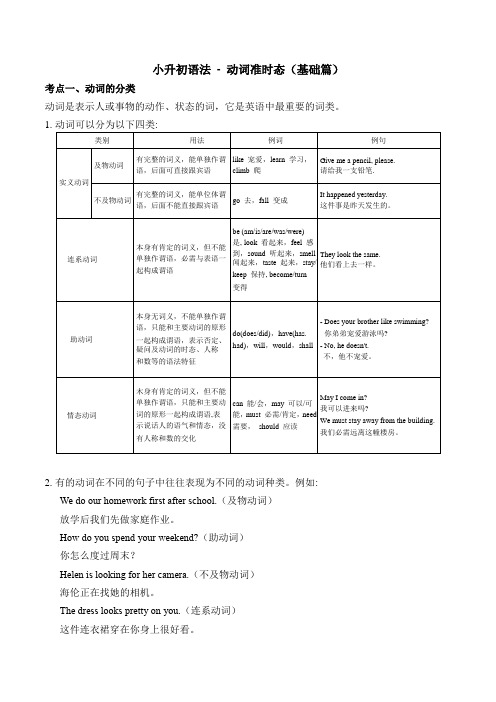
小升初语法-动词准时态(基础篇)考点一、动词的分类动词是表示人或事物的动作、状态的词,它是英语中最重要的词类。
1.2.有的动词在不同的句子中往往表现为不同的动词种类。
例如:We do our homework first after school.(及物动词)放学后我们先做家庭作业。
How do you spend your weekend?(助动词)你怎么度过周末?Helen is looking for her camera.(不及物动词)海伦正在找她的相机。
The dress looks pretty on you.(连系动词)这件连衣裙穿在你身上很好看。
3.有些动词可以和一些别的词构成短语来表达一个概念,其作用和一个单独的动词差不多。
例如:Please pick up the book. 请捡起这本书.Turn on the TV, please. 请打开电视。
动词短语的主要类型有:由“动词十副词”构成的动词短语,假如宾语为名词,可以把宾语放在副词前面,也可以把宾语放在副词后面;假如宾语是人称代词,则必需把它放在动词与副词之间。
例如:Put on the coat. =Put the coat on. 穿上外套。
Here's a sweater for you. Put it on, please. 这儿有一件毛衣给你。
请穿上它。
Pick up the wallet. =Pick the wallet up. 把钱包捡起来。
My wallet is on the ground. Would you please pick it up for me?我的钱包在地上。
请你帮我把它捡起来好吗?4.动词主谓全都和动名词/动词不定式。
(1)动词主谓全都动词在充当谓语时,要和主语在人称和数上保持全都。
① 人称:与主语在人称上全都。
例如:I am a student. (第一人称单数)我是一名同学。
小升初英语四大时态复习讲解及真题专项练习含答案
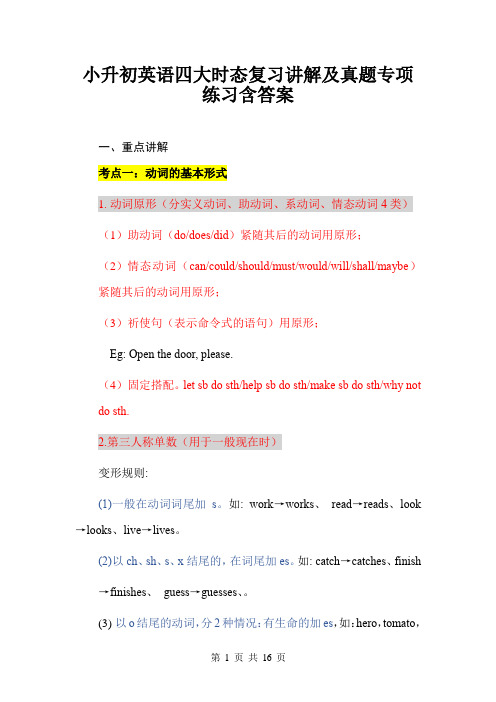
小升初英语四大时态复习讲解及真题专项练习含答案一、重点讲解考点一:动词的基本形式1.动词原形(分实义动词、助动词、系动词、情态动词4类)(1)助动词(do/does/did)紧随其后的动词用原形;(2)情态动词(can/could/should/must/would/will/shall/maybe)紧随其后的动词用原形;(3)祈使句(表示命令式的语句)用原形;Eg: Open the door, please.(4)固定搭配。
let sb do sth/help sb do sth/make sb do sth/why not do sth.2.第三人称单数(用于一般现在时)变形规则:(1)一般在动词词尾加s。
如: work→works、read→reads、look →looks、live→lives。
(2)以ch、sh、s、x结尾的,在词尾加es。
如: catch→catches、finish→finishes、guess→guesses、。
(3)以o结尾的动词,分2种情况:有生命的加es,如:hero,tomato,potato;没有生命的加s,如:radio,photo。
(4)以辅音字母加y结尾的动词,变y为ies。
如: fly→flies、study →studies、carry→carries.(5) 不规则变化。
如: have→has ,are→is,were→was3.现在分词(用于现在进行时)变形规则:(1)一般在动词后加ing。
如: work→working、read→reading、look →looking、wait→waiting。
(2)以不发音的e结尾的动词,去掉e,再加ing。
如: smile→smiling、move→moving、take→taking、write→writing。
(3)以重读闭音节结尾的且词尾只有一个辅音字母的,双写这个辅音字母加ing。
如: sit→sitting、stop→stopping、cut→cutting、run →running、swim→swimming.(4)少数几个以ie结尾的动词,将ie改为y加ing。
小升初英语动词专题讲解及练习--包括be动词和行为动词的比较,助动词和情态动词

动词加ing 的变化规则直接加ing cook-cooking swing-swinging eat-ea ng draw-drawing 以不发音的e 结尾,去e 加ing dance dance——dancing make-making, write —wri ng ride ride——riding have have——having skate skate——ska ng have-having take-taking hike-hiking 双写末尾的辅音字母run-ru nning swim-swi mming get-ge tting shop shop——sho pping动词+s 的变化规则 直接加-s cook→cooks, look→looks, like→likes以o. s. x. sh. ch.结尾,加-es do→does, go go→→goes watch→watches, wash→washes 以“辅音字母+y”结尾,变y 为i, 再加-es study→studies fly→flies 元音字母(a i e o u) +y 结尾,则直接加s: buy→buys play→plays say→says 特殊:have----has He has a small nose. 动词末尾加-ed cook-cooked ,cleaned, washed, listened, looked, played 结尾是e 加d taste-tasted, loved, used, liked 双写末尾的辅音字母 stop-stopped plan--planned 以“辅音字母+y”结尾的,变y 为i , 再加-ed study-studied worry---worried 词义词义 原形原形 过去式过去式 词义词义 原形原形 过去式过去式 是 am, is (be) was 走 go went 是 are (be) were 有 have, has had 买 buy bought 受伤受伤 hurt hurt 来 come came 制造制造 make made 做 do, does did 唱歌唱歌 sing sang 画 draw drew 睡觉睡觉 sleep slept 吃 eat ate 跑 run ran 感觉感觉 feel felt 说 say said 飞 fly flew 看见看见 see saw 读read read 听到听到hear heard 四、be 动词和行为动词的用法区别1.Be动词包括:is, am, are, was, were 2.实义动词:某个实际做出来的动作词语,如:swim, wash, do, go, buy, fly, sleep等等。
小升初英语四大时态复习讲解及真题专项练习含答案

小升初英语四大时态复习讲解及真题专项练习含答案一、重点讲解考点一:动词的基本形式1.动词原形(分实义动词、助动词、系动词、情态动词4类)(1)助动词(do/does/did)紧随其后的动词用原形;(2)情态动词(can/could/should/must/would/will/shall/maybe)紧随其后的动词用原形;(3)祈使句(表示命令式的语句)用原形;Eg: Open the door, please.(4)固定搭配。
let sb do sth/help sb do sth/make sb do sth/why not do sth.2.第三人称单数(用于一般现在时)变形规则:(1)一般在动词词尾加s。
如: work→works、read→reads、look →looks、live→lives。
(2)以ch、sh、s、x结尾的,在词尾加es。
如: catch→catches、finish→finishes、guess→guesses、。
(3)以o结尾的动词,分2种情况:有生命的加es,如:hero,tomato,potato;没有生命的加s,如:radio,photo。
(4)以辅音字母加y结尾的动词,变y为ies。
如: fly→flies、study →studies、carry→carries.(5) 不规则变化。
如: have→has ,are→is,were→was3.现在分词(用于现在进行时)变形规则:(1)一般在动词后加ing。
如: work→working、read→reading、look →looking、wait→waiting。
(2)以不发音的e结尾的动词,去掉e,再加ing。
如: smile→smiling、move→moving、take→taking、write→writing。
(3)以重读闭音节结尾的且词尾只有一个辅音字母的,双写这个辅音字母加ing。
如: sit→sitting、stop→stopping、cut→cutting、run →running、swim→swimming.(4)少数几个以ie结尾的动词,将ie改为y加ing。
(2021年整理)初中英语动词分类讲解及练习(有答案)
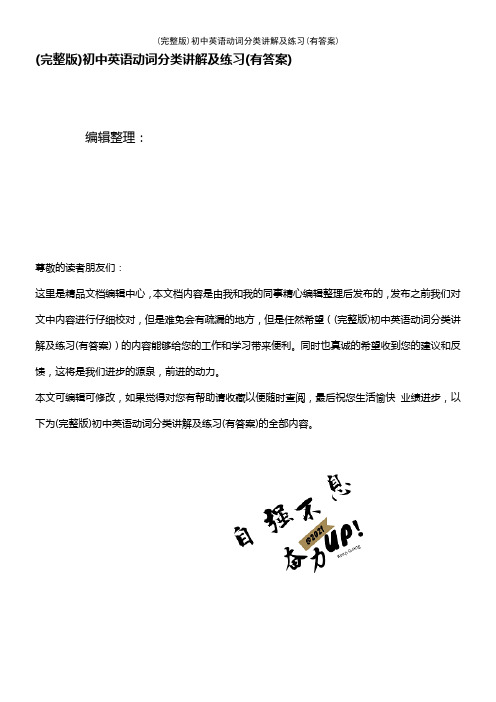
(完整版)初中英语动词分类讲解及练习(有答案)编辑整理:尊敬的读者朋友们:这里是精品文档编辑中心,本文档内容是由我和我的同事精心编辑整理后发布的,发布之前我们对文中内容进行仔细校对,但是难免会有疏漏的地方,但是任然希望((完整版)初中英语动词分类讲解及练习(有答案))的内容能够给您的工作和学习带来便利。
同时也真诚的希望收到您的建议和反馈,这将是我们进步的源泉,前进的动力。
本文可编辑可修改,如果觉得对您有帮助请收藏以便随时查阅,最后祝您生活愉快业绩进步,以下为(完整版)初中英语动词分类讲解及练习(有答案)的全部内容。
(完整版)初中英语动词分类讲解及练习(有答案)编辑整理:张嬗雒老师尊敬的读者朋友们:这里是精品文档编辑中心,本文档内容是由我和我的同事精心编辑整理后发布到文库,发布之前我们对文中内容进行仔细校对,但是难免会有疏漏的地方,但是我们任然希望 (完整版)初中英语动词分类讲解及练习(有答案)这篇文档能够给您的工作和学习带来便利。
同时我们也真诚的希望收到您的建议和反馈到下面的留言区,这将是我们进步的源泉,前进的动力。
本文可编辑可修改,如果觉得对您有帮助请下载收藏以便随时查阅,最后祝您生活愉快业绩进步,以下为〈(完整版)初中英语动词分类讲解及练习(有答案)> 这篇文档的全部内容.动词概述表示动作或状态的词叫做动词。
可以分为以下四类:一、实义动词■①及物动词与不及物动词根据后面是否带宾语,行为动词又可分为及物动词和不及物动词,及物动词.Vt。
vi 。
They study hard.I know them well。
注:有的动词既可作及物动词,也可用作不及物动词。
如:She sings very well.She sang an English song just now。
英语里有不少实义动词可以兼作及物动词和不及物动词。
兼作及物动词和不及物动词时,____不变。
试比较:Shall I begin at once?She began working as a librarian after she left school.When did they leave Chicago?They left last week。
小升初英语-动词讲义(有答案)全国版
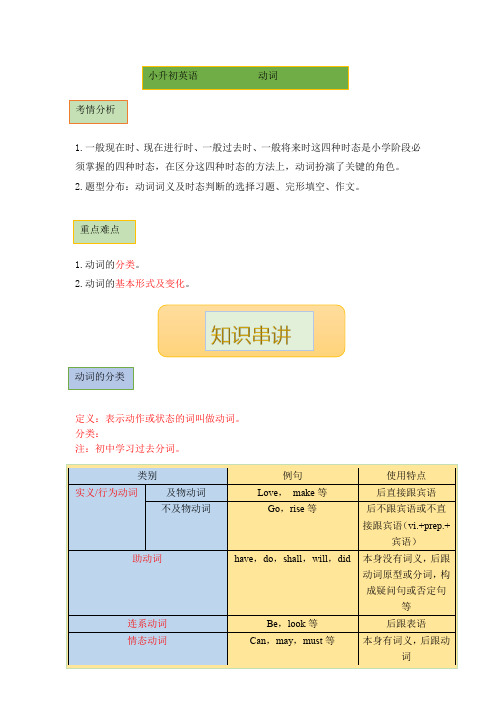
1.一般现在时、现在进行时、一般过去时、一般将来时这四种时态是小学阶段必须掌握的四种时态,在区分这四种时态的方法上,动词扮演了关键的角色。
2.题型分布:动词词义及时态判断的选择习题、完形填空、作文。
1.动词的分类。
2.动词的基本形式及变化。
定义:表示动作或状态的词叫做动词。
分类:注:初中学习过去分词。
详解:1.行为动词,又称实义动词,表示动作或状态,能独立表达意思。
动词根据其后是否直接带有宾语,可分为两类,及物动词vt.(transitive verb)、不及物动词vi.(intransitive verb)I read books on the weekend.My father likes reading.2.连系动词,不能独立表达意思,必须与形容词、名词等一起来表达意思,常用的连系动词有be (am/is/are/was/were)动词和其他的连系动词(look/stay)等。
注:重点内容!感官系动词(look,smell,taste,sound,feel)+adj.拓展(1)表感官的系动词:look,sound,taste,smell,feel(这些词用形容词作表语)(2)表似乎的系动词seem,appear(3)表变化的系动词:become,get,turn,grow,make,come,go,fall,run(4)表依旧的系动词:remain,keep,stay,continue,stand,rest,lie,hold(5)可带名词作表语的系动词:become,make,look,sound,fall,prove,remain,turn (该词后接的单数名词前多不用冠词。
如:He turned teacher.)I am tired now.Yesterday was Sunday. John looks happy.3.助动词,本身没有意义,不能独立表达意思,必须与动词一起来表达意思,常用的助动词有do/does/did.He does not like apples.Did you go to the park last week?4.情态动词,本身有一定的意义,但也不能独立使用,必须与主要的动词一起来表达意思,表示说话人的语气和情态(没有人称和数的变化)。
【小升初】英语总复习课件 - 专题 第4课时 基础梳理(4) 全国通用(含答案)
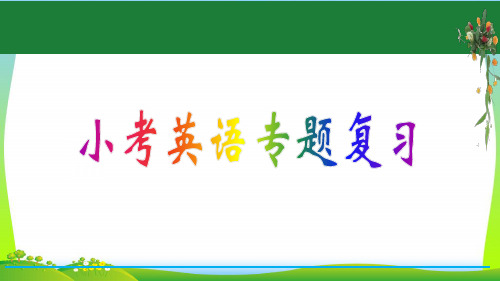
◆重点词汇讲解
1.sheep 名词,绵羊 【联想】sheep的单数和复数形式是一样的。记住:千万不要认为 sheep的复数形式是sheeps。【搭配】three sheep 三只绵羊 【例句】There are two sheep on the farm.农场里有两只绵羊。 2.how much 多少钱 【例句】—How much is it? 它多少钱? —It is ten yuan. 十元。 【 拓 展 】 how much 还 可 以 询 问 不可 数 名 词 的数 量 。 如 :How much milk is there in the glass?玻璃杯里有多少牛奶?注意:how many用来询问可数名词的数量。如:How many kites are there in the sky?天上有多少个风筝?
48.Whose __p_a_n_t_s__ are these? 这条裤子是谁的? ____T_h_e_y_ a_r_e______ mine. 是我的。 49.It's time _____f_o_r_d_in_n_e_r____. 该吃晚饭了。 50.__W_h__a_t'_s_ the weather ___l_ik_e___ in New York? 纽约天气怎么样? 51.It's time ___t_o_g_e_t_u_p_______ .该起床了。 52.__W__h_a_t__ca_n__I _d_o_f_o_r_y_o_u_?____我能为你做点什么? 53.—____H_o_w__m_u_c_h_____ is this skirt? 这条短裙多少钱? —___I_t_'s___$89. 它89美元。
- 1、下载文档前请自行甄别文档内容的完整性,平台不提供额外的编辑、内容补充、找答案等附加服务。
- 2、"仅部分预览"的文档,不可在线预览部分如存在完整性等问题,可反馈申请退款(可完整预览的文档不适用该条件!)。
- 3、如文档侵犯您的权益,请联系客服反馈,我们会尽快为您处理(人工客服工作时间:9:00-18:30)。
第四讲:动词一、【考点解读】动词在英语的词类中非常重要,在接下来的学习中,小朋友们将会了解它的分类并掌握其用法。
我们本次将从动词的分类、不同时态句型中的变化形式等方面进行纵向对比学习。
学生要特别背诵一些不规则动词的变化形式以及谓语动词和非谓语动词的区别。
二、【知识讲解】知识点1——动词分类定义:动词表示人或事物的动作或状态。
A 常见的实义动词考点名称含义固定句型例句※see/hear sb do sth:表示宾语完成了某个动作或者经常做这个动作。
see/hear sb doing sth:表示宾语正在进行的动作。
B 系动词(主语+连系动词+形容词作表语)1)系动词的三种词汇意义⑴表示状态的持续。
常见的动词有:stand、keep、stay、lie、continue、burn、hold等。
如:The soldiers on guard keep alert under all circumstances.The fish stayed fresh.⑵表示具有某种性质、特征和处于某种状态。
常见的动词有:smell、sit、look、sound、mean、break、feel、ring、seem、appear、taste、read、remain等。
如:The actor looked the main part in the play.She didn’t look her age.The idea sounds great.What he said appeared true.⑶表示动词的动作或过程所产生的结果或状态的开始。
常见的有:go、come、grow、run、rise、wear、prove、turn、wash、fall、drop、blush、become、get、turn、out、come off等。
如:The food goes bad in hot weather.Her great aim will come true one day in the future.His money ran short.The plan turned out wrong and useless in the end.He came off second best.The technology came in useful.根据以上系动词的三种含义,可将系动词分为三类:持续类系动词、感官类系动词和变成类系动词。
2)系动词的五种语法结构因为系动词是构成系表结构的先决条件,所以五种语法结构都是系表结构。
只是表语可由不同的词,如:形容词(小升初常考)、名词、副词、分词和介词短语充当。
※系动词+形容词这类结构最常见。
常见的系动词有:sound、look、feel、smell、turn、eat、taste、keep、、grow、play、go、become等。
如:The song sounds very beautiful.The soup tastes delicious.C.助动词的分类:D 情态动词的用法知识点2——动词的表现形式及其构成方法(详见本书“动词的时态”)知识点3——句子的成分和基本句型三、【典例探究】【例题1】:---What ________the sign mean?---It means you can’t _________here.A. is, smokingB. does, smokeC. did, smokeD. are, smoke 【例题2】:She can’t ride a bicycle. She _______school on foot.A.must get toB. has to get toC. has to go toD. have to go to 【例题3】:She is willing things and help others.A. to shareB. shareC. sharingD. to sharing 答案:B C A四、【课堂运用】【基础】【练习1】照样子,写出动词的四种形式。
例:write writes writing wrote written1.walk _______ _________ __________ ________2.study ________ ___________ ___________ ____________3.wish ________ ___________ ___________ ____________4.play ________ ___________ ___________ ____________5.rain ________ ___________ ___________ ____________6.go ________ ___________ ___________ ____________7.die ________ ___________ ___________ ____________8.run ________ ___________ ___________ ____________e ________ ___________ ___________ ____________10.do _______ ___________ ___________ ____________11.fly ________ ___________ ___________ ____________12.stop________ ___________ ___________ ____________13.see________ ___________ ___________ ____________14.swim________ ___________ ___________ ____________15.buy________ ___________ ___________ ____________【练习2】选择正确的单词填空。
1.He ______ (am, is, are)from England. He and I (am,is, are )friends.2.That dog________ (am, is, are) a fat and lazy.3.We ________ (don’t, doesn’t, didn’t) have lessons every Friday afternoon.4.There _______ (be, is, are) a big hospital and three schools near the park.5.The salad _______ (taste, tastes) delicious.6.Ann is ________ (sitting, siting) in the bedroom, while Andy is (runing, running)in the garden.7.Our school _______ (have, has) two big gates.8.We ______ (will, should) always treat other people nicely.9.Bob _____ (may, can) not like the gift that I bought him.10. I have much work to do this evening and I ______ (don’t, can’t) go to the party.【巩固】【练习1】用所给的实义动词的适当形式填空。
1.Can you ______ (speak) English?2.We ____ (have) a maths test tomorrow.3.____John _____ (know) that man in black?4.Peter ______ (ride) his new bicycle in the garden. He’s happy.5.Tom wants _____ (drink) some juice.6.I like _____ (collect) stamps very much.7.Jack often ______ (go) to school at seven.8._____you_____ (go) swimming last week?9.He _____ (open) the door just now.10. I am good at _____ (sing).【练习2】用所给动词的适当形式填空。
1.It’s _____ ( rain) now. We can’t _____ (go) out and play.2.My uncle ____ (come) to see us tomorrow.3.Sit down, please. ______ (have) some tea.4.Lucy ______(phone) home just now. But nobody_______(answer).5.Who can ______ (make) him ______ (laugh)?6.People _____ (wear) warm clothes in cold winter.7.I shall ask Alice ______ (help) you.8.The boy ____ (grow) up. He became a basketball player.9.I ________ (study) in this school in 2001.10. I saw them __________ (clean) the street yesterday.【拔高】【练习1】用动词的适当形式填空1.It’s the first time I ____________ (travel) by plane.2.You _____________ (catch) a cold if you __________ (not put) on your overcoat.3.While I ___________ (mop) the floor, my mother ____________ (do)the washing.4.By last year, he___________ (change) three jobs.5.All work and no play __________ (make) Jack a dull boy.6.He ____________ (be) away from home for three years.7.----________you __________ (be) to Shanghai Grand Theater?----Yes, I have. I _________ (go) there last month.8.He told us that he __________ (ask) for leave the next week.9.I felt sick when I ___________ (take) the exam.10.Mother didn’t leave the baby until he __________ (fall) asleep.【练习2】单项选择填空1.I didn’t see you at the meeting. I thought you ______ not there.A.wereB. wasC. hadD. are2.We were glad to know that he _______in Shanghai for another week.A.will stayB. would stayC. are stayingD. had stayed3.I ______sure that you ______ the exam.A.am...passB.am...will passC. was...passD. was...will pass4.Our teacher told us that water _____at 0°C.A.freezeB. frozeC. freezesD. would freeze5.Guangzhou ______in the south of China.A.locatesB.is lyingC.is locatingD. lies6.We ______all the work by last week.A.finishedB. have finishedC. had finishedD. will finish7.I ________see him when I was walking in the street.A.happen toB. was happening toC. happened toD. happens to8.I ______the window as soon as it ________to rain.A. closed...startedB. closed...was startingC. was closing...startedD. had closed...started9.There ______an English contest next week. Will you take part in it?A.is havingB.is going to haveC. will haveD. will be10.We _____close friends for more than ten years.A.becameB. wereC. have becomeD. have been四、【课后巩固】五、【习题1】1.写出下列动词的过去时和过去分词am/is eatare fallbegin feelbreak givebring gobuild havebuy hearcan hitcome hurtcut keepdo knowdraw learndrink leavedrive make2.用动词的适当形式填空。
